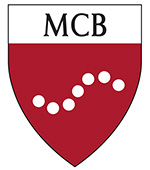The Board of Tutors in the Biochemical Sciences has awarded the Henderson Prize to Yuen Ting Chow (MCB ‘23). Named for biochemist and Harvard professor Lawrence J. Henderson (1878-1942), the Henderson Prize celebrates students who do thesis work on molecular or chemical biology. It is one of the highest honors an undergraduate thesis at Harvard can receive.
“The committee unanimously chose Yuen Ting Chow’s as the winning thesis because of what she was able to achieve in terms of the science and the high quality of writing and clarity of presentation,” says MCB and CPB Concentration Advisor Dominic Mao.
Chow’s thesis, titled “A Chemically-induced Proximity DNA-Encoded Library (CiP-DEL) Approach for the Identification of Selective and Cooperative Bromodomain Degraders,” explored how a drug discovery method called CiP-DEL can be used to identify small molecules that can target and degrade overexpressed proteins. She conducted her work in the Stuart Schreiber’s lab at the Broad Institute, where she worked with postdoc Shuang Liu and graduate student Zher Yin Tan. Chow’s CiP-DEL screens focused on versatile molecules called PROteolysis-TArgeting Chimeras (PROTACS).
“In my project, I optimized CiP-DEL screening technology and applied it to the Bromodomain and Extraterminal (BET) protein family,” Chow explains. “Members of this protein family have high sequence identities, which makes finding selective PROTACs–PROTACs that target one protein in the family but not the others–especially difficult. This is an issue, as different BET protein family members are involved in different cancers and diseases, and it is important to reduce side effects and off-target toxicities. By using the CiP-DEL screening technique, I hoped to discover PROTACs with selective properties for specific members of the BET protein family. I conducted a CiP-DEL screen on BET proteins, synthesized putative hit PROTACs, and validated them in purified proteins and in cell lines.”
“While more work still needs to be done, my results show that CiP-DEL screens are a promising technique for finding selective BET protein PROTACs, and should be investigated further, not only for BET proteins, but also for disease-relevant protein targets from other families,” she adds.
Chow says she feels “honored and lucky” to receive the Henderson Prize. “I am very fortunate to have a supportive PI and wonderful research mentors who have patiently taken me under their wings and taught me everything from biology/chemistry lab techniques to manuscript writing,” she says. “Conducting research has been a very significant part of my college experience, especially these past two years when I often spent more time in lab than in class. It feels nice to receive a bit of recognition for all the hours that I have poured in and makes all the late nights in the lab feel more worthwhile.”
In the fall, Chow will begin an MD/PhD program with a long-term goal of becoming a clinician-researcher who both develops novel therapies and works directly with patients.
Though she arrived at Harvard intending to focus on MCB classes, her coursework inspired her to integrate chemistry into her approach. “Over the years, I slowly fell in love with chemistry and saw how it can be used to better understand biological systems,” Chow says. “This budding interest is what led me to join the Schreiber lab and design a thesis project that involved not only biology, but a bit of chemical synthesis as well.” She will continue exploring chemical biology in her graduate program.
Chow adds that she is grateful to many people at Harvard and in her life. “First, I would like to thank Professor Stuart Schreiber, Dr. Shaung Liu, and Zher Yin Tan for their superb mentorship these past few years,” she says. “I would also like to thank my MCB tutor Paula Fraenkel, Dominic Mao, Monique Brewster, and Irina Cashen for a fulfilling experience as a MCB concentrator. I am also very grateful for my amazing family and friends who have supported me throughout this grueling thesis process!”



